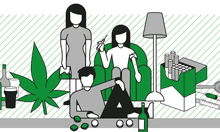Doctors need to start having honest and open conversations with their patients about illicit drug-taking for pleasure, an eminent addiction specialist from London has told a medical conference in Melbourne.
Dr Adam Winstock, an addiction psychiatrist who also founded the Global Drug Survey, told the International Medicine in Addiction conference on Sunday that doctors were doing a disservice by only speaking about drug-related harms.
But health professionals needed to help a hidden but potentially at-risk group of people who like using drugs, but whose lives were not necessarily dominated by them, he said.
Those illicit drug users should have easy access to credible information from medical professionals about how to minimise their risk of harm while taking drugs, and how to self-regulate while using them, Winstock said.
“What I want to say to doctors is, we work with 10% of the population who use drugs, and they are those suffering from addiction and harms,” Winstock told Guardian Australia.
“But 90% of illicit drug users don’t enter emergency departments or become addicted, and could use some help and information to make sure they don’t.
“We need to start a conversation with these people and the way you do that is by saying, for some people, drug-taking is really nice, and that’s OK. You can talk to those people and have an informative conversation with them. But people in my profession aren’t usually encouraged to think outside of the people they treat.”
In June, Winstock will release the world’s first Safe Drug Using Guide, based on data from his Global Drug Survey – the world’s biggest annual, online survey of drug use trends.
When most people wanted to find about a drug, they usually asked their drug-using friends, Winstock said, who may not be as aware of risky drug interactions and unsafe drug-taking levels as medical professionals.
“I had hundreds of emails following the release of our global drug survey, saying ‘this is really good, but you’re a drug-harm obsessed doctor, and if you want to ask people how they use drugs, you need to be more balanced to get useful information’.
“It was like a lightbulb went off in my head.”
It was then he said he realised there was a large group of drug users in the general population not being reached.
Winstock cited ecstasy as an example, saying about 0.6% of MDMA users in Australia ended up in hospital emergency departments.
“Many of those hospitalisations could have been avoided if the user knew about staying hydrated, safe quantities and not mixing drugs,” he said.
“Why don’t we have guidelines telling people if they want to take ecstasy, they should take one-quarter of a pill while their mates take nothing, so if nothing happens after half an hour they know it’s probably not ecstasy and to throw it out, and if they do start to feel unwell, they have mates around them who aren’t under the influence who can look after them.
“It’s just being honest about drugs, that’s all.
“I’m not calling for an end to prohibition. I’m calling for an honest conversation.”




Comments (…)
Sign in or create your Guardian account to join the discussion